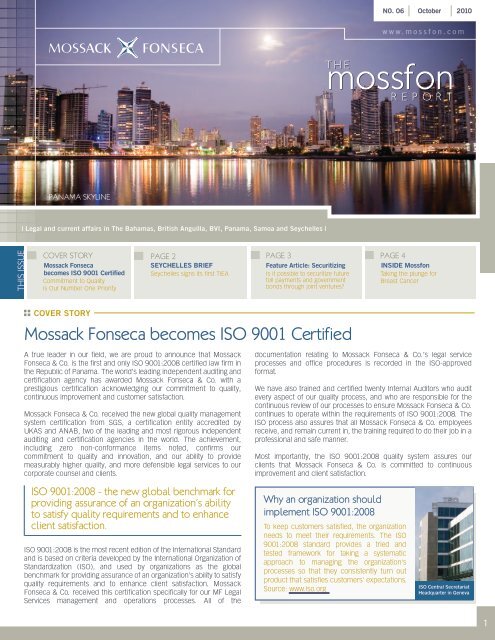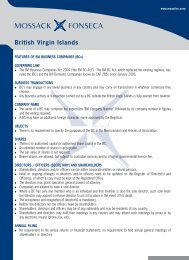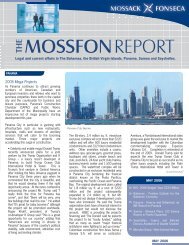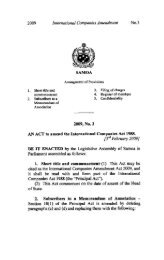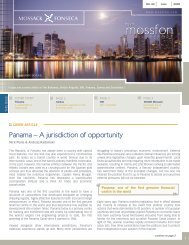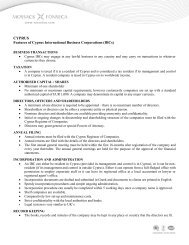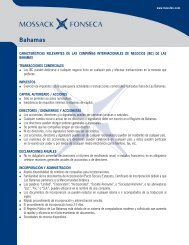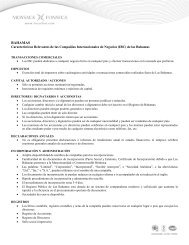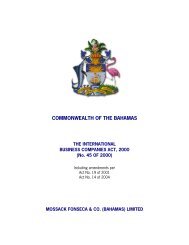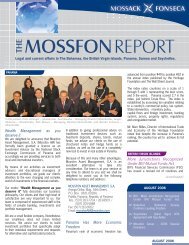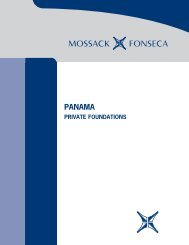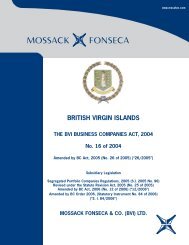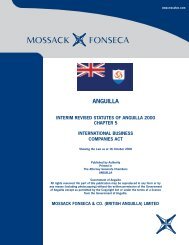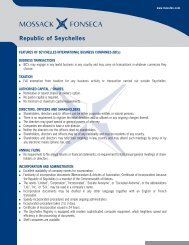Mossack Fonseca becomes ISO 9001 Certified
Mossack Fonseca becomes ISO 9001 Certified
Mossack Fonseca becomes ISO 9001 Certified
Create successful ePaper yourself
Turn your PDF publications into a flip-book with our unique Google optimized e-Paper software.
THIS ISSUE<br />
PANAMA SKYLINE<br />
| Legal and current affairs in The Bahamas, British Anguilla, BVI, Panama, Samoa and Seychelles |<br />
COVER STORY<br />
<strong>Mossack</strong> <strong>Fonseca</strong><br />
<strong>becomes</strong> <strong>ISO</strong> <strong>9001</strong> <strong>Certified</strong><br />
Commitment to Quality<br />
is Our Number One Priority<br />
COVER STORY<br />
PAGE 2<br />
SEYCHELLES BRIEF<br />
Seychelles signs its first TIEA<br />
<strong>Mossack</strong> <strong>Fonseca</strong> <strong>becomes</strong> <strong>ISO</strong> <strong>9001</strong> <strong>Certified</strong><br />
A true leader in our field, we are proud to announce that <strong>Mossack</strong><br />
<strong>Fonseca</strong> & Co. is the first and only <strong>ISO</strong> <strong>9001</strong>:2008 certified law firm in<br />
the Republic of Panama. The world’s leading independent auditing and<br />
certification agency has awarded <strong>Mossack</strong> <strong>Fonseca</strong> & Co. with a<br />
prestigious certification acknowledging our commitment to quality,<br />
continuous improvement and customer satisfaction.<br />
<strong>Mossack</strong> <strong>Fonseca</strong> & Co. received the new global quality management<br />
system certification from SGS, a certification entity accredited by<br />
UKAS and ANAB, two of the leading and most rigorous independent<br />
auditing and certification agencies in the world. The achievement,<br />
including zero non-conformance items noted, confirms our<br />
commitment to quality and innovation, and our ability to provide<br />
measurably higher quality, and more defensible legal services to our<br />
corporate counsel and clients.<br />
<strong>ISO</strong> <strong>9001</strong>:2008 - the new global benchmark for<br />
providing assurance of an organization’s ability<br />
to satisfy quality requirements and to enhance<br />
client satisfaction.<br />
<strong>ISO</strong> <strong>9001</strong>:2008 is the most recent edition of the International Standard<br />
and is based on criteria developed by the International Organization of<br />
Standardization (<strong>ISO</strong>), and used by organizations as the global<br />
benchmark for providing assurance of an organization’s ability to satisfy<br />
quality requirements and to enhance client satisfaction. <strong>Mossack</strong><br />
<strong>Fonseca</strong> & Co. received this certification specifically for our MF Legal<br />
Services management and operations processes. All of the<br />
PAGE 3<br />
Feature Article: Securitizing<br />
Is it possible to securitize future<br />
toll payments and government<br />
bonds through joint ventures?<br />
N0. 06 October 2010<br />
www.mossfon.com<br />
PAGE 4<br />
INSIDE Mossfon<br />
Taking the plunge for<br />
Breast Cancer<br />
documentation relating to <strong>Mossack</strong> <strong>Fonseca</strong> & Co.’s legal service<br />
processes and office procedures is recorded in the <strong>ISO</strong>-approved<br />
format.<br />
We have also trained and certified twenty Internal Auditors who audit<br />
every aspect of our quality process, and who are responsible for the<br />
continuous review of our processes to ensure <strong>Mossack</strong> <strong>Fonseca</strong> & Co.<br />
continues to operate within the requirements of <strong>ISO</strong> <strong>9001</strong>:2008. The<br />
<strong>ISO</strong> process also assures that all <strong>Mossack</strong> <strong>Fonseca</strong> & Co. employees<br />
receive, and remain current in, the training required to do their job in a<br />
professional and safe manner.<br />
Most importantly, the <strong>ISO</strong> <strong>9001</strong>:2008 quality system assures our<br />
clients that <strong>Mossack</strong> <strong>Fonseca</strong> & Co. is committed to continuous<br />
improvement and client satisfaction.<br />
Why an organization should<br />
implement <strong>ISO</strong> <strong>9001</strong>:2008<br />
To keep customers satisfied, the organization<br />
needs to meet their requirements. The <strong>ISO</strong><br />
<strong>9001</strong>:2008 standard provides a tried and<br />
tested framework for taking a systematic<br />
approach to managing the organization's<br />
processes so that they consistently turn out<br />
product that satisfies customers' expectations.<br />
Source: www.iso.org<br />
<strong>ISO</strong> Central Secretariat<br />
Headquarter in Geneva<br />
1
2<br />
FEATURE ARTICLE<br />
SEYCHELLES BRIEF<br />
Seychelles signs its first TIEA<br />
Seychelles and the Netherlands signed an agreement to<br />
promote cooperation in tax matters through a tax information<br />
exchange agreement (TIEA). The agreement was signed by<br />
principal secretary for finance Ahmed Afif in the presence of<br />
Albert Geerz, the Dutch honorary consul in Seychelles.<br />
Mr. Afif said this is the first such accord Seychelles has signed,<br />
and it will help in the battle to bring about greater transparency<br />
in international transactions. “We strongly believe that we need<br />
to develop an international business centre in Seychelles and<br />
promote international financial services,” he added. He<br />
maintained that it is vital for Seychelles to meet the<br />
expectations of regulatory bodies such as the Organisation for<br />
Economic Cooperation and Development (OECD).<br />
“We have to be seen as a jurisdiction with best<br />
practices and ensure that companies based in<br />
both countries cannot do business without<br />
paying their taxes.” Ahmed Afif<br />
Mr. Afif also added that through these norms Seychelles aims<br />
to show the OECD that it is committed to the rules of<br />
transparency and exchange of information. Seychelles cannot<br />
afford to be blacklisted as it is a small and vulnerable country<br />
that depends on imports. “We have to be compliant and work<br />
with these institutions and at the same time show our ability to<br />
work as a team with all the international partners,” he added.<br />
Mr. Geerz agreed and stated that the TEIA shows the good<br />
cooperation that has been in place for a very long time<br />
between the two countries. “It shows that regarding tax matters<br />
things are developing further and this will be in the best<br />
interests of both partners.” Mr. Afif closed by saying that as<br />
soon as other countries are ready, Seychelles will sign a similar<br />
agreement with them.<br />
A TIEA at Work:<br />
For example, if there is a Seychellois company in the<br />
Netherlands that is avoiding paying taxes, then all the<br />
necessary information should be available from this country for<br />
an investigation. Through this TIEA, each country will ensure<br />
that its relevant authority has the power to obtain and provide<br />
on request information held by banks and other financial<br />
institutions. This also involves information on the ownership of<br />
companies, partnerships and trusts. The Netherlands will,<br />
when making a request for information under the agreement,<br />
give details such as the identity of the person who is being<br />
investigated, a statement of the information sought, the tax<br />
purpose for which it is sought and the name and address of any<br />
person believed to have that information.<br />
Bahamas Insight<br />
TIEAs are only the beginning<br />
According to Ryan Pinder, an attorney adept in US tax policy and<br />
the PLP MP for the Elizabeth Constituency in The Bahamas<br />
Parliament, the Bahamas has to set progressive policies in the<br />
financial services industry in order to prepare for future initiatives<br />
by the Organization for Economic Cooperation and<br />
Development (OECD).<br />
Mr. Pinder warned that the OECD is sure to set out other<br />
requirements with respect to tax information reporting and<br />
requests of countries. His comments came following the speech<br />
given by Douglas H. Shulman, IRS Commissioner and Chair of the<br />
OECD Forum on Tax Administration, before the OECD on June 8,<br />
2010. In his message, Commissioner Shulman foreshadowed the<br />
direction of international tax compliance by specifically stating that<br />
“the next rung in the evolutionary ladder of international tax<br />
administration [is] the progression from cooperation to<br />
coordinated action on global tax issues.”<br />
Mr. Pinder suggested that the new regimes indicated by Mr.<br />
Shulman will allow multiple countries to jointly conduct an audit of<br />
a taxpayer in international jurisdictions. "It is unclear whether this<br />
is contemplated under the current TIEA regime, but it is evidence<br />
that information reporting is going to be more intricate than a<br />
single request from a single country," he said.<br />
According to Mr. Pinder, the OECD and the Forum on Tax<br />
Administration see the pressures on so-called tax havens as an<br />
opportunity to "achieve significant long-term compliance in the<br />
campaign against individuals parking assets and income in<br />
offshore banks". Along with these changes in policy come<br />
changes in enforcement and prosecution for malfeasance<br />
Mr. Pinder added that TIEAs are not the end of global pressures<br />
on offshore financial sectors. According to him, the Bahamas has<br />
to evolve along with global tax information reporting. He<br />
suggested the Bahamas can "survive" under the current OECD<br />
model, even with the increased pressures on transparency and<br />
compliance. "We have to distance ourselves from the perception<br />
as a jurisdiction of tax cheats and a place to hide wealth," he<br />
concluded.<br />
The list below contains the Tax Information Exchange<br />
Agreements (TIEAs) signed by The Bahamas.<br />
Canada<br />
Australia<br />
Spain<br />
Finland<br />
Iceland<br />
Norway<br />
Sweden<br />
Greenland<br />
The Faroe Islands<br />
Denmark<br />
Mexico<br />
France<br />
Belgium<br />
Netherlands<br />
Argentina<br />
China<br />
New Zealand<br />
United Kingdom<br />
San Marino<br />
Monaco<br />
United States
2<br />
FEATURE ARTICLE<br />
Is it possible to securitize future toll payments<br />
and government bonds through joint In ventures? Brief<br />
By Ramses Owens, Esq. Attorney-at-Law and Trustee, Mossfon Trust Corporation<br />
The term for and the process of "securitizing" is increasingly accepted<br />
in the Securities Markets. Securitization consists in the issuance of<br />
instruments, paper or documents evidencing debt, either through the<br />
stock market or the general public, by means of direct sales previously<br />
approved by the governmental authority of the Securities Market,<br />
backed by allocated or autonomous assets that have been previously<br />
transferred to an entity, and whose assets consist of present or future<br />
income flows.<br />
In other words, it is the act of transforming a portfolio of existing<br />
accounts receivable or a property or any documents evidencing a debt<br />
or existing right, into cash, by replacing as a bank as common financial<br />
intermediary for purchasers of securities issued by an issuer, on or off<br />
the stock exchange. And you can also transform "potential or future<br />
assets", i.e. future sales flows, into cash. Simply put, it is to transfer an<br />
existing asset or a future income flow to a third party (under a trust) or<br />
third-party fiduciary, so that the latter may become, through the trust,<br />
an issuer at a stock market.<br />
The securitization of "future income flows" can be perhaps more risky<br />
for the investing public than the securitization of existing assets. An<br />
account receivable is already an "asset" because it exists in the<br />
accounting records as a result of income earned but not collected,<br />
whereas a future income flow represents future revenue, which is the<br />
product of a reality, an infrastructure or an existing law that allows that<br />
future production. This type of securitization consists in transferring to a<br />
third party (trustee of a trust), the rights enjoyed by a company on its<br />
future sales, whether products or services.<br />
Securitization in Panama<br />
The northern and southern beltways or “toll corridors” of the city of<br />
Panama are under a state concession for a set period of time. This right,<br />
which has a current value, allows them to collect, through a built<br />
infrastructure, income in the future for period of time fixed or to be<br />
fixed. Statistics and forecasts can quite accurately establish the flow of<br />
money that will be generated through the years. These are not<br />
"accounts receivable", but "future income flows." This right to collect<br />
any "future flows" can be transferred to a third party fiduciary, thus<br />
creating an autonomous patrimony consisting of such "right" which<br />
serves as collateral to issue securities (shares or bonds) in the Panama<br />
Stock Exchange. This securitization can be done concomitantly with the<br />
GLOSARY<br />
Securitizing:<br />
“titularizar” in Ecuador and<br />
Colombia or “securitizar” in<br />
Chile<br />
Entity:<br />
corporation governed by a<br />
Trust, or a trust per se<br />
purchase of rights by the State, so that the "originator" of or "party<br />
constituting" such securitization is the State itself. The government buys<br />
and at the same time transfers in trust said right for the future collection<br />
of tolls. After a sensible time period, the Trustee issuer shall transmit the<br />
proceeds obtained from the sales of securities to the Mexican seller. To<br />
expedite the placement, one or several underwriters could take part in<br />
the process.<br />
The same principle applies to any assets that belong to the State or<br />
Government. Share certificates are assets for the state. The holding by<br />
the State of shares from joint ventures (Union Fenosa-Panama, Edemet,<br />
Edechi and other businesses related to power generation<br />
telecommunications) can be transferred in Trust to create separate<br />
assets for issuing securities. The Trustee Issuer would surely be the<br />
National Bank of Panama, but nothing prevents a private trust, duly<br />
constituted and under the supervision of the Panama Superintendency<br />
of Banks, from assuming this task if the necessary legal procedures are<br />
carried out. The investor receiving a security arising from such issue,<br />
acquired through a stock exchange, generates a steady and stable<br />
income for many years. Panama, a country that is considered to have<br />
an "investment grade", which is no longer merely a "speculative" one,<br />
would draw the attention of international institutional investors, who<br />
would surely invest in these debt papers. Many Panamanians could also<br />
become creditors of their own State. These elements add a romantic<br />
reality to the equation.<br />
Securitization at work<br />
Property:<br />
parcel, lot, or a building to be<br />
built, under construction or<br />
already built<br />
N0. 06 October 2010<br />
In a fictional construction project, the owner of a parcel of land<br />
contributes to a trust this parcel of land together with the plans,<br />
blueprints and feasibility studies. The assets contributed<br />
constitute in themselves sufficient guarantee that the regulatory<br />
authority of the Securities Market (National Securities<br />
Commission, in Panama’s case) will approve the Trust as an<br />
"issuer" of its own securities, which are sold to the public. That<br />
public investor receives an interest rate until the sale of the<br />
project is completed, on which date the investor must receive<br />
his/her capital back.<br />
Existing right:<br />
bonds, notes, factoring<br />
contracts, leases, public debt,<br />
government concession rights,<br />
or any document created by<br />
human ingenuity<br />
3
INSIDE MOSSFON Taking the Plunge for Breast Cancer<br />
Julie Tann Morgan, from <strong>Mossack</strong> <strong>Fonseca</strong>’s Gibraltar Office, participated in a tandem<br />
skydive on Sunday, June 27 and raised over a thousand pounds for a wonderful breast<br />
cancer campaign. She was one of the 19 brave souls who volunteered for this fundraiser.<br />
Although she was the last to jump and admitted to being terribly scared, she was able to<br />
collect from all her sponsors and make a great contribution to a wonderful cause.<br />
For more information, please visit<br />
http://issuu.com/andalucialife/docs/andaluciam _life _ august _ 2010/14<br />
Tandem basics<br />
Tandem skydiving or tandem parachuting refers to a type of skydiving where a<br />
student skydiver is connected via a harness to a tandem instructor. The instructor<br />
guides the student through the whole jump from exit through freefall, piloting the<br />
canopy, and landing. The student needs only minimal instruction before making a<br />
tandem jump.<br />
N0. 06 October 2010<br />
4


